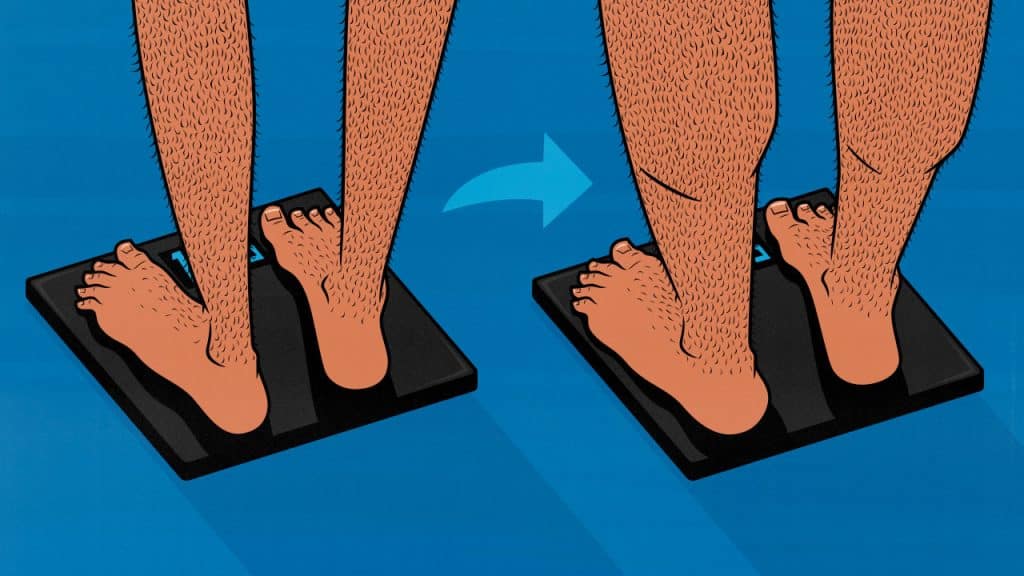
How Long Should You Bulk For?
In theory, you could bulk slowly over several years. That’s what some natural bodybuilders do. They eat in a small calorie surplus as part of their regular lifestyle, only stopping when they need to lean down for a bodybuilding competition. However, they have fierce appetites and large stomachs, making it relatively easy to gain weight.
For most skinny guys, eating in a sustained calorie surplus is incredibly difficult, not least because our metabolisms adapt to larger calorie intakes. You might start a bulk by eating 3,000 calories per day. A few months later you might struggle to gain weight on 4,000 calories. You could add even more calories to your diet, but that’s easier said than eaten.
As a naturally skinny guy with a meagre appetite, the thought of bulking forever fills me with a deep sense of dread, leaving little room for extra food. My first and second bulks were 3 months each, which was enough time for me to gain a lean 45 pounds. My third bulk was 5 months long. The longest I’ve made it was 8.
Over the past 10 years of helping over 10,000 guys bulk up, we’ve developed a system for figuring out how long to bulk and when to stop.
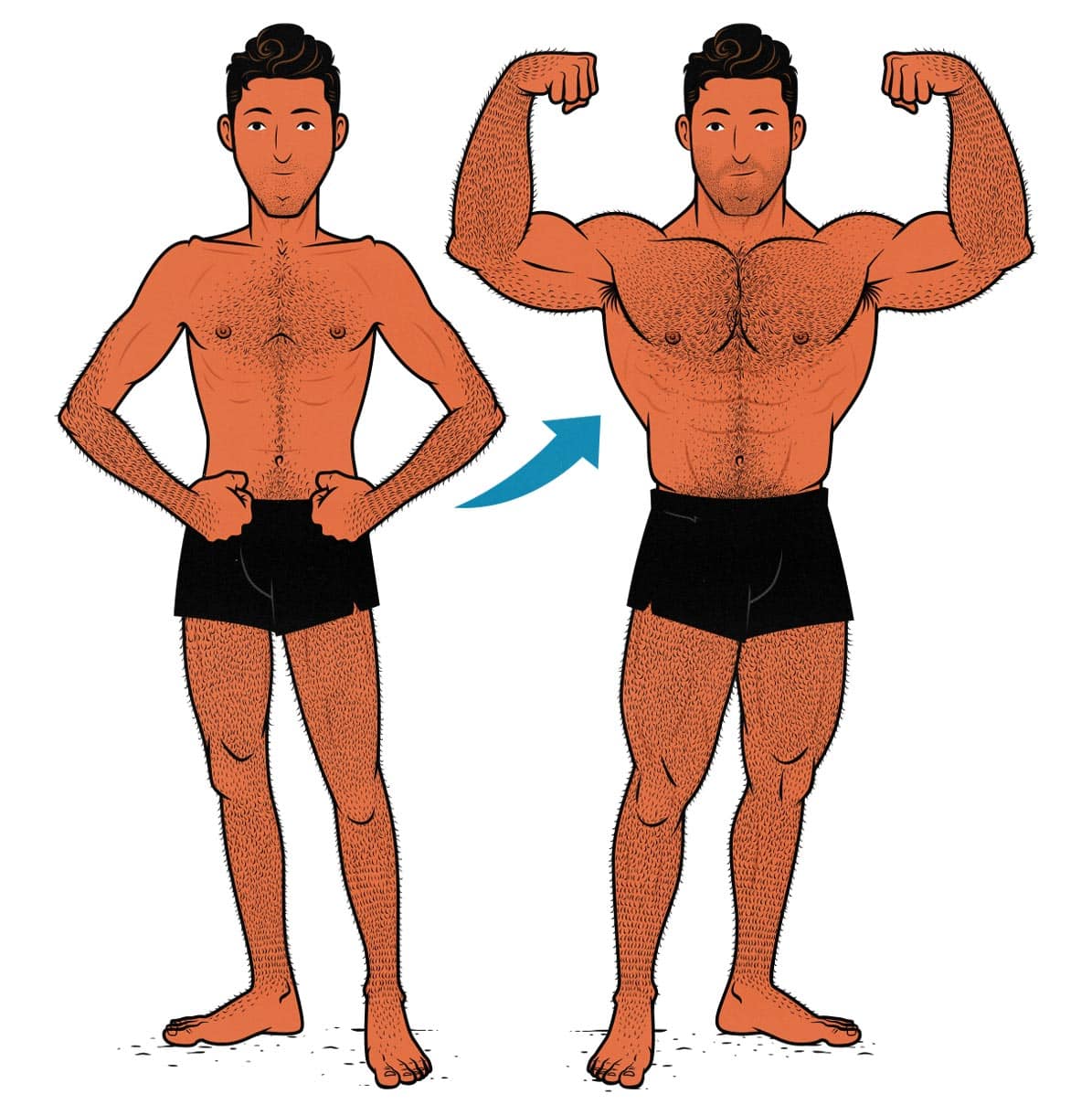
Introduction
If you’re like most people, eating in a small calorie surplus is easy, allowing you to gain weight effortlessly forever. In that case, you can bulk until you gain too much fat. More on that at the end.
If you’re like me, you may find it difficult to gain weight. Not impossible, and not necessarily unpleasant—I love bulking—just difficult. It’s a concerted effort. You’ll need to plan out a start and end date, treating it like a challenge. Let’s go over how to do that.
The 3 Types of Bulks
Bulking can be difficult. You need to lift weights and eat an abundant bulking diet. Either one of those things is difficult on its own. Adding them both to your lifestyle simultaneously can be even harder, and not always in the way we assume.
Lifting weights is sustainable. Your energy levels will grow to accommodate the extra exercise. Your mood will improve, you’ll sleep more deeply, and you’ll want to keep doing it. It’s something you can do forever.
Eating a good diet is sustainable, too. You’ll feel better when you eat better food. You’ll want to keep eating well. The habits are hard to develop but easy to maintain.
Bulking is a whole different beast. Training hard enough to maximize your rate of muscle growth can be rough. You’ll need to push yourself a little bit further than you want to. That’s why structured workout routines work so well.
And we aren’t built to gradually gain weight forever. Your appetite is supposed to help you maintain a stable weight. To bulk up, you’ll need to override that, eating more than feels natural. That can be hard, especially if you’re bulking aggressively or for a long time.
As we alluded to earlier, many skinny guys are “hardgainers.” Our metabolisms are adaptive. When we eat extra calories, our metabolisms burn hotter, attempting to cancel out the surplus.
An adaptive metabolism won’t stop you from gaining weight, but as your bulk drags on for longer, your calorie needs will grow ever higher. At a certain point, you’ll need to take a break and let your metabolism settle back down.
So, how long should you bulk for? You have a few options. Let’s go over the pros and cons of each.
The Aggressive 3-Month Bulk
During my first bulk, I gained 20 pounds in 3 months over the course of a summer. The next summer, I set aside another 3 months and gained another 25 pounds. I didn’t have the foresight to document my first bulk, but here are the progress photos from my second bulk:
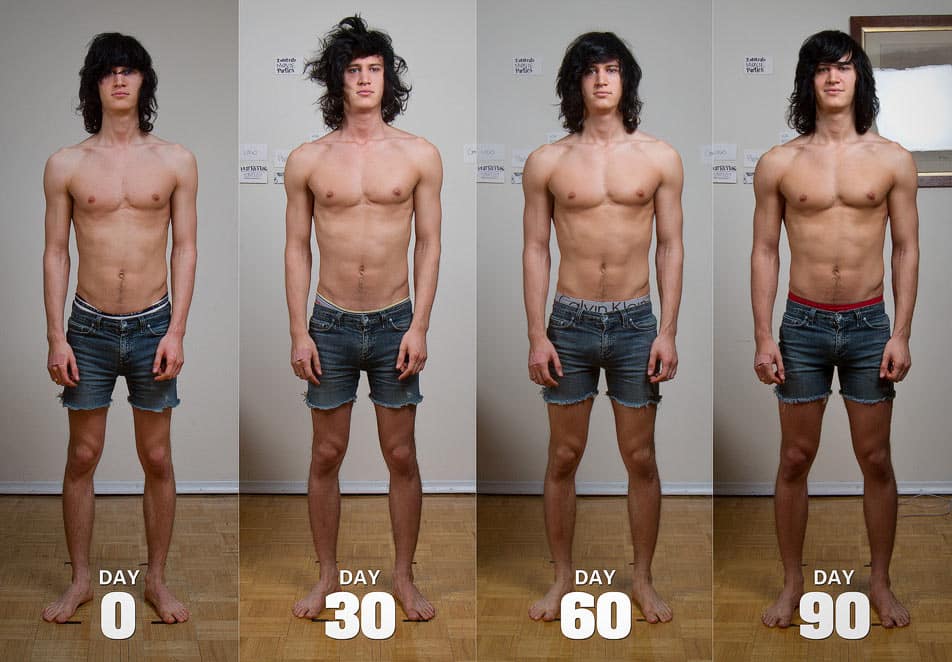
At the time, Jared and I were starting up a graphic design business, living together as roommates. He was just as skinny as I’d been the summer before, and he’d seen how I’d gained 20 pounds. If I could do it, he knew he could do it, so he decided to join me for that second bulk. He gained 33 pounds in 3 months:
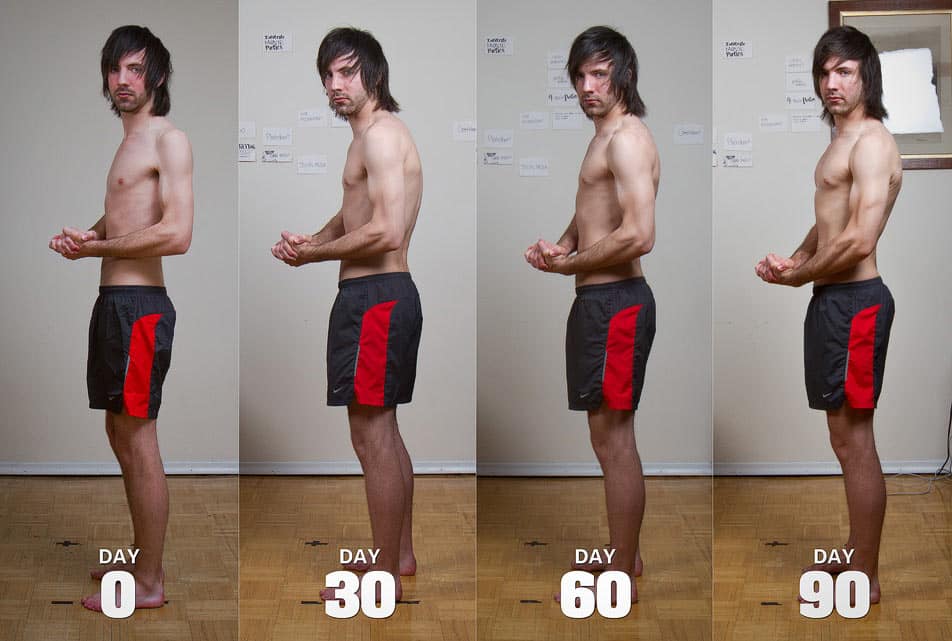
We’ve helped thousands of other skinny guys get similar results within that same timeframe. 3 months is just long enough for most skinny guys to get remarkable results. For example, here are Eddi’s progress photos while doing the Bony to Beastly Program:
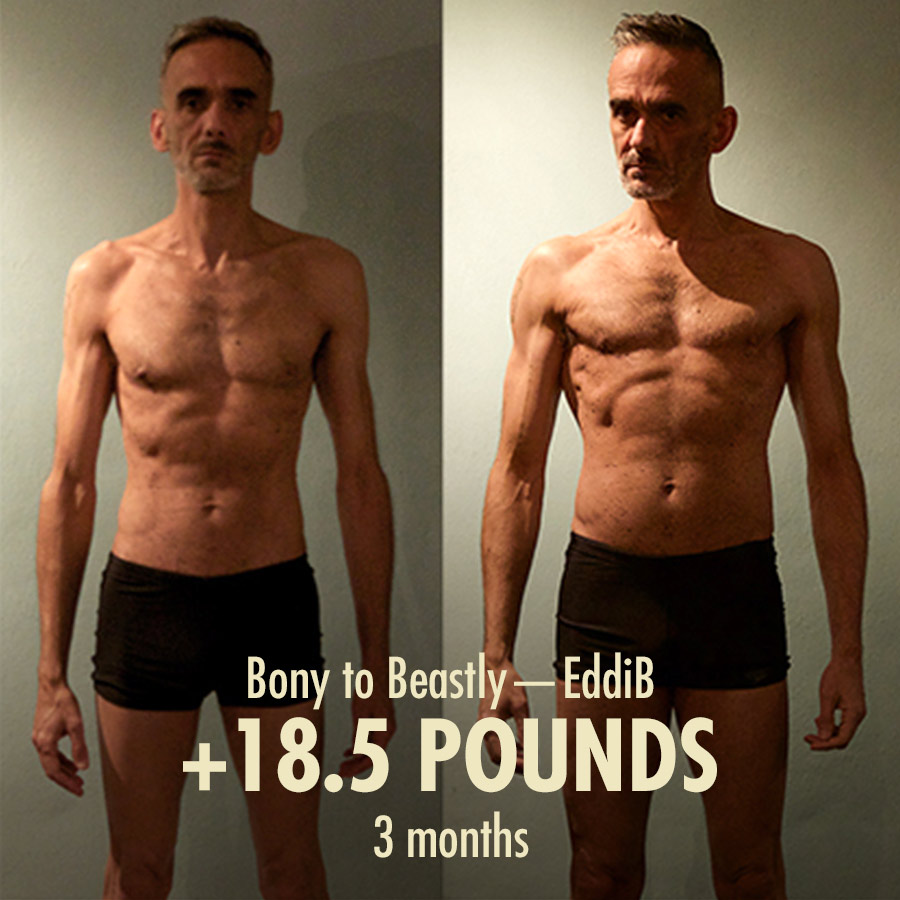
As you can see from our before photos, these shorter bulks tend to work best for guys who are starting off thinner. We have more room on our frames for muscle growth, allowing us to get more dramatic newbie gains. Plus, we’re naturally lean, and gaining fat doesn’t scare us.
The Classic 5-Month Bulk
While running thousands of guys through our bulking progmam, we noticed that 3 months wasn’t always long enough. You need to gain around 20 pounds to make a remarkable transformation. If you’re gaining at a moderate pace of 1 pound per week, that takes about 5 months.
For example, Thanos gained 26 pounds in 5 months, gaining about 1.2 pounds per week.
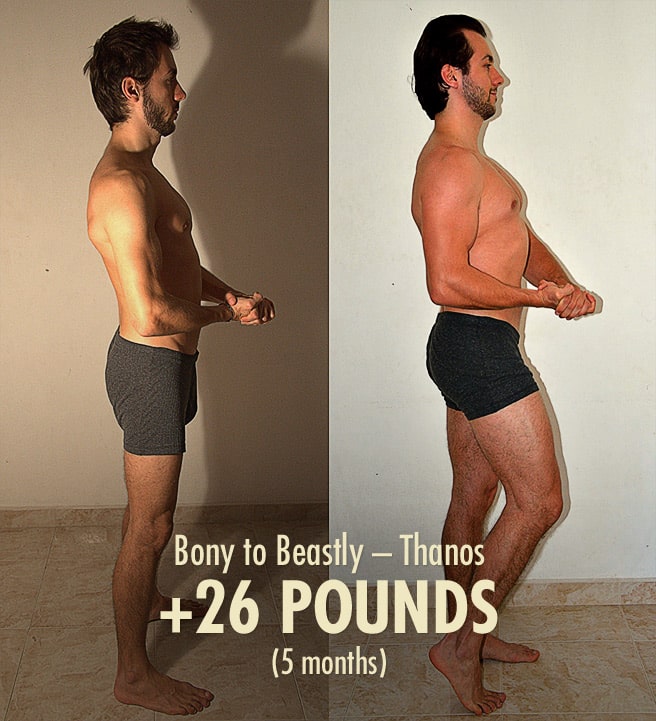
For another example, Albert gained weight at about the same pace, gaining 25 pounds in 5 months. However, if I recall correcty, he was doing his medical residency, took a break in the middle of his bulk, and came back to finish it later. It wasn’t 5 months all in a row. (That was smart. If you wait for the perfect situation to start bulking, you may never find it.)
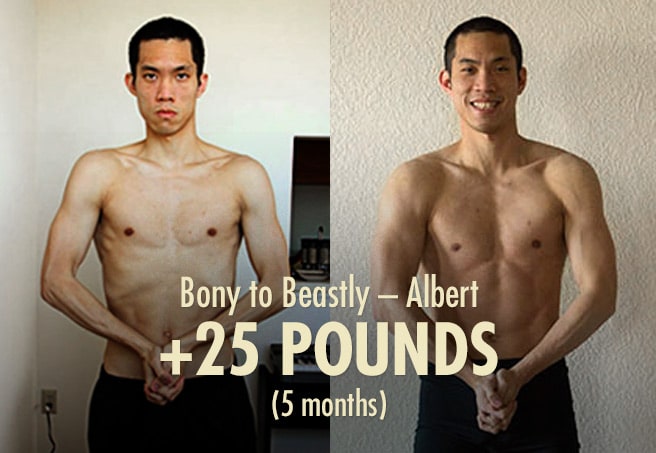
When we averaged out the results of people doing our bulking program, they gained 25 pounds in 5–7 months. Some people gain less, others more. But if you’re doing a classic 5-month bulk, this is in the realm of what you can expect.
The Long Lean Bulk
There are a few reasons you might want to take it slower and bulk for longer. Maybe you’ve run out of newbie gains and your rate of muscle growth is slowing. Maybe you’re skinny-fat and you want to keep your gains leaner. Maybe you have a sensitive digestive system and you can’t stomach much extra food.
Fortunately, if you’re gaining weight more slowly, you won’t need to eat as many extra calories, so you should find it easier to bulk for longer. Still, the longest I’ve ever made it was in my latest bulking, going from 183 to 203 pounds in 8 months.
Here are a couple more examples. First, here are Abousha’s progress photos after 9 months of bulking. He was constantly on the road, travelling for work, so he took it slower.
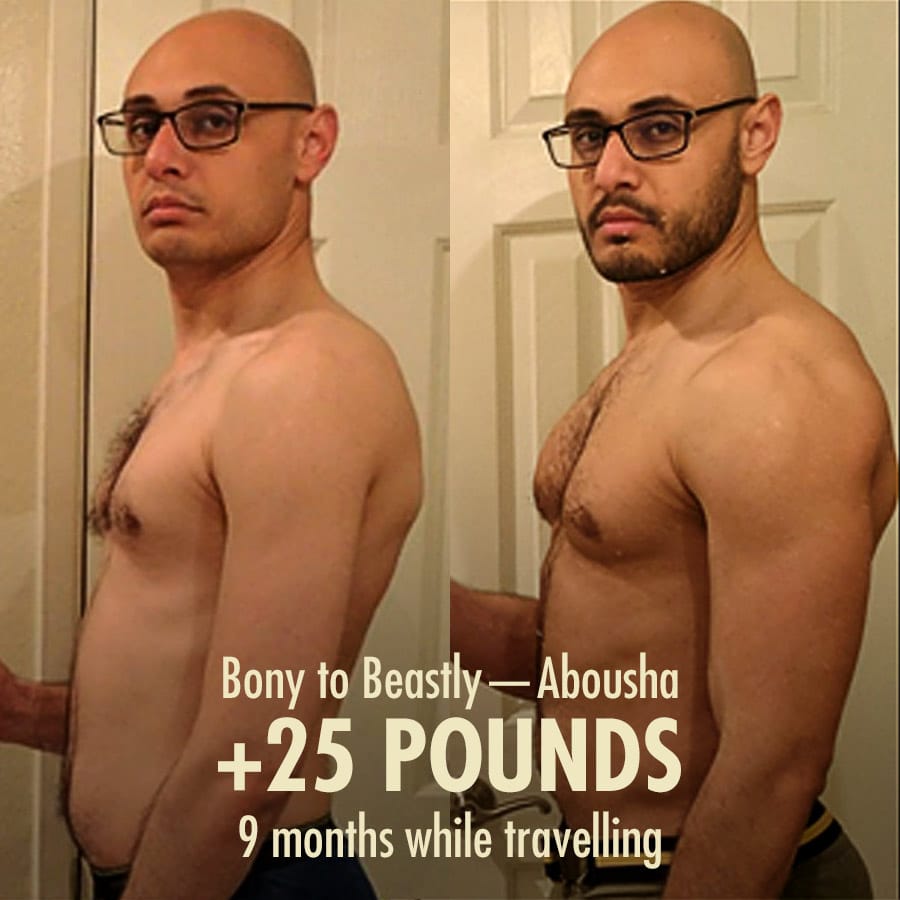
For a second example, here’s Lucas. He did a 9-month lean bulk, gaining 20 pounds without gaining a visible amount of fat.
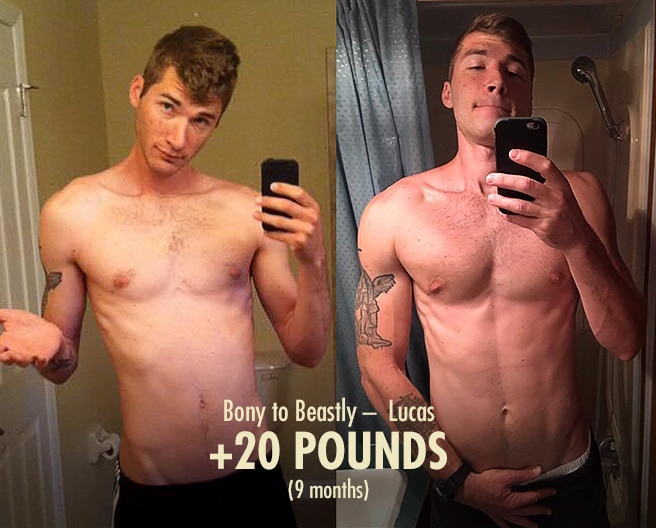
When Should You Stop Bulking?
I recommend setting a clear start and end date to your bulk. However, nothing is stopping you from doing several bulks in a row. You could bulk for 3 months, celebrate, and then dive right back into another 3-month bulk.
In our program, we have guys report in after every 5-week workout phase. They post their weight gain, measurements, and progress photos, we give them feedback, and they dive into another phase. We recommend bulking for at least 3 phases in a row, which comes out to just under 4 months. Most guys bulk for one more phase, hitting 5 months.
At that point, you need to decide whether you want to keep bulking. There are 4 factors to consider:
- Are you too fat? It’s okay to gain some fat while bulking, but you should make sure it isn’t accumulating around your organs. To do that, measure your waist circumference at your navel (belly button). If it’s approaching 37 inches, you aren’t in trouble yet, but you’re getting close, and it’s probably time to stop bulking.
- Are you still making progress? If you’re getting stronger every week, making good progress on most of your lifts, it makes sense to stick with what’s working. Keep going. No sense stopping now.
- Are you bigger and stronger than ever before? Some people get stuck in an endless bulking and cutting cycle that doesn’t add up to anything. That won’t ever happen if you finish each bulk at a new peak. (Also, you may not need to cut after bulking.)
- Do you need a break? If you’re tired of eating so much food, pushing yourself so hard in the gym, or following such a structured lifestyle, it’s okay to stop bulking.
What to Do After Bulking
Many skinny guys have fast and adaptive metabolisms. As we get deeper into our bulks, our caloric needs grow ever larger, threatening to swallow us whole. If your calorie needs are becoming overwhelming, do a reverse bulk. Alternatively, you could ease back into maintenance or you could cut.
When you finish bulking, maybe you want to spend a few months working on another goal, such as improving your cardio. Thankfully, you can adapt to cardio without eating in a calorie surplus. Gaining muscle then fitness is a powerful combination. Plus, if you decide to bulk again in the future, you’ll be in better shape for it.

Alright, that’s it for now. If you want more muscle-building information, we have a free bulking newsletter for naturally thin guys. If you want us to walk you through the process of building muscle, check out our bulking program. It includes a 5-month full-body workout routine, diet guide, recipe book, and one-on-one support in our online community. Or, if you want a customizable intermediate bulking program, check out our Outlift Program.

